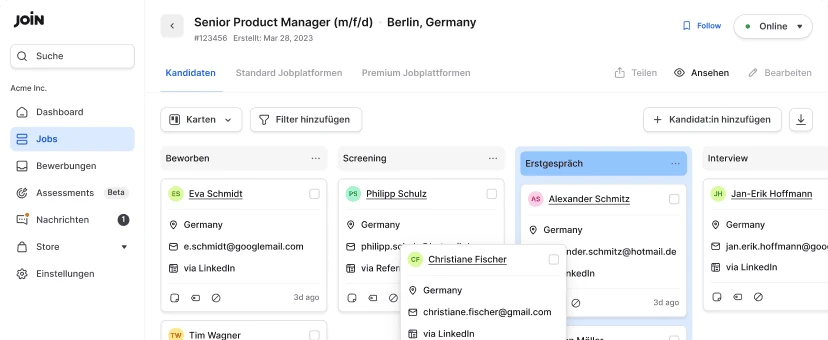Best interview questions for your hiring process
Electrician Interview questions
Electricians help to bring life to a construction project. They’re wiring experts who can install new lighting or devices to your construction site, as well as troubleshoot and repair any existing electrical problems.
You should seek these skills in your Electrician:
- Significant experience working in a previous Electrician role.
- High level of knowledge when it comes to electrical safety codes and procedures.
- Ability to work both independently and as part of a team.
- Ability to follow technical instructions and electrical blueprints.
- Ability to draft up electrical plans.
- Rapid problem-solving skills.
Interviewing an Electrician
As Electricians have such specialised knowledge, hiring the right person for your team is essential. They need to be fast, safe and efficient workers with a high understanding and regard for safe construction practices. So, an interview is a perfect opportunity to find out if your candidate has these!
That’s why we have designed the following guide to aid you in the interview process. These example Electrician interview questions are designed to be used early in the interview stages to find if your candidate has both the cultural and skill requirements to join your team.
How to open the job interview
Even the most skilled Electricians may feel slightly nervous before their interview. However, this can lead to problems during your conversation with them.
A great way to combat this is to put your candidate at ease by asking a few more ‘chatty’ interview questions to help warm the conversation up. This only has to last a few minutes but will make a massive difference over time.
Best interview questions for your hiring process
See our Electrician job description hereFor the interview
A positive opener to start
What is your proudest career moment as an Electrician?
How did you move into a career as an Electrician?
Behavioral Questions
What have your previous working environments looked like?
When working on several large installations or wiring projects at once, how do you stay on track and organised?
This will often be the way in which Electricians work during larger projects. Knowing your candidate has some behaviours and techniques that can keep them organised and ensure the best efficiency during these busier times will be a huge tick in their box.
How do you stay up to date on the latest trends and changes in the Electrical industry?
Regulations, laws, trends and processes are constantly changing in the Electrical industry. Knowing your hire would constantly be evolving and educating themselves on these updates is a huge benefit.
When working with a particularly difficult client or customer, how do you stay positive and professional?
Being an excellent Electrician is about more than just your skill with wires and lighting. A good Electrician also needs to have a certain level of people skills, especially if they will be working closely with external clients. Knowing they can exhibit polite and professional behaviour when faced with picky clients will give you peace of mind.
Soft Skills
How would you resolve a situation where you were working collaboratively with a team member and they disagreed with the way you wanted to complete a task?
This can happen from time to time. Your candidate should calmly and professionally communicate with their colleagues, and confidently discuss their knowledge, which will minimise disruptions in the future.
What steps would you take if a colleague requested a change to your electrical plans that you weren’t sure how to approach?
Here, you are looking for communication and negotiation skills. The candidate should be able to ask the colleague for further clarity and information on the changes that need to be made. They should also feel comfortable in negotiating and discussing the changes, using their own specific knowledge to assist them in these conversations.
What skills do you have that make you perfect for an Electrician position?
This is a chance for your potential Electrician to show off any soft or hard skills they have that they think can assist them in this role. You’ll also get an insight into their communication and confidence levels!
When talking to a client with no technical knowledge about specific Electrical plans, how do you ensure that they are following?
A candidate should be able to use their communication and people skills to describe difficult concepts to non-technical people. This could involve checking in with the client throughout their conversation and using diagrams to illustrate tricky points.
Hard Skills
Over the course of your career, what is the largest project you have worked on? What were a few of the specific tasks you needed to complete?
This will give you an idea of the candidate’s previous working experience and the type of tasks they have performed over their career.
Which software or methods have you used to draw up electrical plans in the past?
Here, you’ll get an insight into whether the candidate’s working style will easily slot into your current processes, or if they will need to be onboarded. Alternatively, you may get an idea of any new skills they can bring to your team.
Which Electrical tools and equipment do you use on a day-to-day basis? How do you remain safe when using these?
This will help to give you a better understanding of the specific tools your candidate is confident in using, as well as their understanding of construction safety processes,
Would you say that you specialised in any areas of electrical work?
While it is not always essential for your candidate to be a specialist in a particular area, knowing whether this is something they classify themselves as will help you understand what they can bring to your team.
How do you test that your electrical work is compliant with local building codes and regulations?
Safety should be at the heart of everything your candidate does. Knowing they have rigorous testing methods to lean on is essential.
Operational / Situational Questions
If you were working with an apprentice Electrician and noticed they were making frequent mistakes, how would you approach this?
Safety and quality need to be at the forefront of your candidate’s mind. In this situation, they should feel comfortable in communicating the mistakes to the apprentice in a professional manner as soon as they notice them being made. They can then guide the apprentice towards the correct method to complete their tasks.
Imagine you have a colleague whose Electrical wiring quality does not match your own. What would you do in this situation?
Here, you’re looking for dedication to safety and quality. Your potential hire should bring the issue up as soon as it is seen, and offer their advice and expertise to the colleague in a professional and encouraging way.
Imagine you receive some critical feedback from a client. How do you rectify this and learn from it in the future?
The candidate should take any possible action that may rectify the client’s problem. This could mean touching up some of their work or passing feedback to a relevant team. They should then detail some learnings.
If you had to make a rapid decision when installing electrical wiring, how would you ensure you were staying safe?
Occasionally, spur of the moment decisions may need to be made by your candidate. Knowing they can follow safety procedures by not rushing the job and properly documenting any changes they’ve made from the original plans is highly crucial.

Start hiring and prepare your interview
All platforms are available for you to promote your job through JOIN.
Create job ad for free


The environments in which Electricians work can vary greatly. Some may work mainly on residential small-scale repairs, while others may specialise in larger electrical installations. Knowing what types of environments your potential hire has worked in will help you better assess their fit in your team and how much onboarding will be needed.